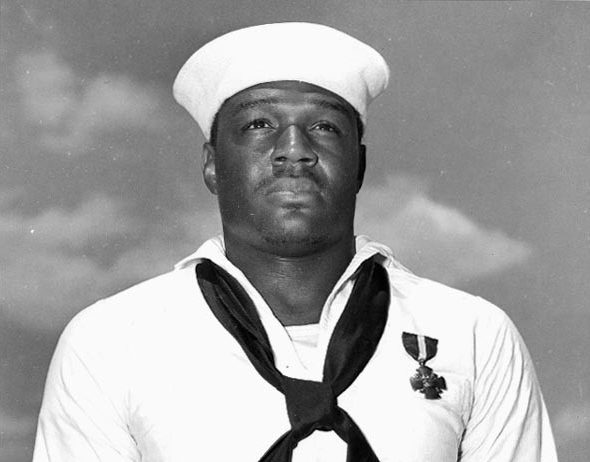The U.S. Navy’s next aircraft carrier will bear the name of Doris “Dorie” Miller, the African-American mess attendant who, against all rules, leapt into combat to aid his comrades during the attack on Pearl Harbor.
The special honor, which has generally been reserved for U.S. presidents, including Abraham Lincoln, Ronald Reagan and John F. Kennedy, marks the first time an aircraft carrier has been named for an African-American, and the first time an enlisted sailor has been so honored, NPR reports.

The Navy is set to make the official announcement on Monday, Dr. Martin Luther King Jr. Day, at Pearl Harbor.
“Doris Miller stood for everything that’s good about our nation, and his story deserves to be remembered [and] repeated wherever our people continue the watch today,” acting Secretary of the Navy Thomas Modly said of the World War II hero.
“Dr. Martin Luther King, Jr. observed, ‘Everybody can be great — because anybody can serve,'” he added. “No one understands the importance and true meaning of service than those who have volunteered to put the needs of others above themselves.”
Miller was a 22-year-old mess attendant serving on the USS West Virginia in 1941. Like most Black sailors at the time, the Waco, Texas, native was limited to roles in the messman’s branch, which entailed manual labor like cooking, laying out an officer’s clothes and even shining his shoes.
Miller was up early on the morning of Dec. 7, 1941, and was heading to sort laundry after serving breakfast when the battleship was hit by a barrage of Japanese torpedoes and bombs. The young sailor was ordered to go to the ship’s bridge to help the ship’s captain, who himself remained at his post as he bled to death from his shrapnel wounds, and Miller also was tasked with carrying his wounded comrades to safety.
As the attack raged on, Miller would take over a .50-caliber anti-aircraft machine gun and fired on the Japanese planes until there was no ammo left.
“The irony of this is that, back in the ’40s, pre-World War II, African-Americans were not allowed to have any jobs where they handled machine guns or any type of lethal force,” Modly explained in an interview with CBS This Morning.
What’s more, a Navy history says Miller was never trained on the weapon.
“It wasn’t hard,” he’s quoted as saying. “I just pulled the trigger and she worked fine. I had watched the others with these guns.”
Despite his heroics that day, Miller wouldn’t be awarded or even recognized for his bravery at Pearl Harbor. He was simply dubbed “‘an unknown Negro sailor.” According to Naval History and Heritage Command historian Regina Akers, it would take pressure from the NAACP and media (Black and white) before the Navy agreed to present Miller with a letter of commendation. But they knew he deserved more.
“In his opinion that’s all he warranted,” said Akers. “However, others disagreed. The press, black and white press, disagreed, the National Association for the Advancement of Colored People disagreed.”
Miller was later awarded the Navy Cross in May 1942, a recognition also met with criticism because of his race. He was the first Black sailor to receive the medal, one of the Navy’s top honors.
The young sailor would go on to become a national celebrity, heading up a two-month speaking tour to promote war bonds and even had his picture featured on a Navy recruitment poster, according to NPR.
Miller wouldn’t survive the war, however. He was serving aboard the aircraft carrier Liscome Bay when it was suddenly sunk by a Japanese torpedo in 1943. More than half the ship’s 900 sailors perished in the Pacific, including Miller. His remains were never recovered.
Now his closest relatives, Florietta Miller and Brenda Haven, are reveling in the fact that their loved on is finally receiving the recognition he deserves.
“Never would have thought my uncle would have been next to Martin Luther King, or even the same day. That’s beautiful!” Haven told CBS This Morning, adding: “That’s a great honor.”
Miller was also honored posthumously with a Purple Heart, among other awards.
Construction on the USS Doris Miller hasn’t started and it could be another seven or eight years before it hits the water, the outlet reported. When the time comes for it to set sail, however, the carrier is expected to travel the seas for up to 50 years.
Watch more in the video below.


